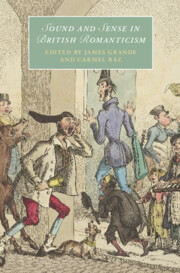Founding Editor
Marilyn Butler, University of Oxford
General Editor
James Chandler, University of Chicago
Editorial Board
Claire Connolly, University College Cork
Paul Hamilton, University of London
Claudia Johnson, Princeton University
Essaka Joshua, University of Notre Dame
Nigel Leask, University of Glasgow
Alan Liu, University of California, Santa Barbara
Deidre Lynch, Harvard University
Jerome McGann, University of Virginia
David Simpson, University of California, Davis
This series aims to foster the best new work in one of the most challenging fields within English literary studies. From the early 1780s to the early 1830s, a formidable array of talented men and women took to literary composition, not just in poetry, which some of them famously transformed, but in many modes of writing. The expansion of publishing created new opportunities for writers, and the political stakes of what they wrote were raised again by what Wordsworth called those ‘great national events’ that were ‘almost daily taking place’: the French Revolution, the Napoleonic and American wars, urbanization, industrialization, religious revival, an expanded empire abroad, and the reform movement at home. This was an enormous ambition, even when it pretended otherwise. The relations between science, philosophy, religion, and literature were reworked in texts such as Frankenstein and Biographia Literaria; gender relations in A Vindication of the Rights of Woman and Don Juan; journalism by Cobbett and Hazlitt; and poetic form, content, and style by the Lake School and the Cockney School. Outside Shakespeare studies, probably no body of writing has produced such a wealth of commentary or done so much to shape the responses of modern criticism. This indeed is the period that saw the emergence of those notions of literature and of literary history, especially national literary history, on which modern scholarship in English has been founded.
The categories produced by Romanticism have also been challenged by recent historicist arguments. The task of the series is to engage both with a challenging corpus of Romantic writings and with the changing field of criticism they have helped to shape. As with other literary series published by Cambridge University Press, this one will represent the work of both younger and more established scholars on either side of the Atlantic and elsewhere.
See the end of the book for a complete list of published titles.

